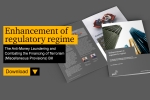Tax perspective
"The Budget has addressed to a large extent the concerns of the OECD with the tax reforms. We hope that the proposed measures will not jeopardise the status of Mauritius as a competitive platform for making and routing investments."

The Budget 2018-2019 provides a number of measures that aim at creating new poles of economic growth and making Mauritius a High Income country. Further, in the wake of the Action Plan on Base Erosion and Profit Shifting (BEPS Action Plan), the Budget has brought tax reforms that will comply with the proposals made by the Organisation for Economic Co-operation and Development (OECD).
The Minister of Finance and Economic Development has continued on his path to reduce the disparity between the “haves and have nots”. He has relieved the middle income earners by creating a new band of taxation, and taxpayers with earnings of up to Rs650,000 will pay tax at a maximum rate of 10%, compared to 15% previously. He has also relaxed the eligibility conditions for the payment of the negative tax being administered by the Mauritius Revenue Authority (MRA).
With the pressure of the OECD to eliminate harmful tax practices, it was expected that the Hon. Minister of Finance and Economic Development would significantly reform our tax system.
The deemed foreign tax credit will be abolished and replaced by the concept of an 80% partial exemption on any foreign source income. This is, however, subject to companies meeting the substantial activities requirements as prescribed by the Financial Services Commission, which is again a condition under BEPS Action Plan.
The Category 2 Global Business regime will be abolished, but GBC2 Licences issued prior to 16 October 2017 will be grandfathered up to 30 June 2021. Companies with global trading activities will be taxed at the rate of 3%. The Freeport regime will also be amended. Hopefully, these amendments will satisfy the OECD.
The taxation of banks has also undergone major reforms. The concept of Segment A and B will be abolished, and banks will be subject to a progressive tax rate of 5% and 15%. The Budget has also introduced an incentive scheme for banks with chargeable income exceeding Rs1.5bn to be taxed at the reduced rate of 5% on meeting certain conditions. The real impact can only be assessed once those conditions are established. Hopefully, banks which already contribute significantly to the coffers of the MRA will not be penalised by this new measure. The special levy will be administered under the VAT Act as from 01 July 2019, which means faster cash for the MRA.
On the administrative front, taxpayers now opting to appeal to the Assessment Review Committee (ARC) will have to pay an additional 5% of the tax assessments. There is presently a large number of tax disputes that are either pending at the objection level or the ARC, and this measure aims at reducing the number of cases through resolution at the objection level. It makes sense that we take steps to expedite the dispute resolution process. However, the financial burden (legal and consultancy costs, interest, etc.) is presently borne by the taxpayer for litigation cases. The taxpayers should also be compensated if a case is eventually ruled in their favour.
"The Category 2 Global Business regime will be abolished, but GBC2 Licences issued prior to 16 October 2017 will be grandfathered up to 30 June 2021. Companies with global trading activities will be taxed at the rate of 3%."
The settlement of tax disputes through the Expeditious Dispute Resolution has been extended to tax assessments of less than Rs10m raised between 01 July 2015 to 30 July 2016. This is yet another opportunity for taxpayers to settle cases with reduced penalties and interests. But we consider that this incentive should have been extended to all tax assessments presently under dispute.
The submission of a statement of assets and liabilities will not be required for taxpayers who have duly submitted their tax returns during the last five years. This will relieve honest taxpayers from the tedious exercise of submitting the statement of assets and liabilities.
The Budget has addressed to a large extent the concerns of the OECD with the tax reforms. We hope that the proposed measures will not jeopardise the status of Mauritius as a competitive platform for making and routing investments. While cash collection and dispute resolution seem to be the top priorities of the MRA, we feel that bolder measures are needed to address them. On the positive side, the Hon. Minister of Finance and Economic Development has very wisely used fiscal measures to increase the disposal income of middle income earners.















